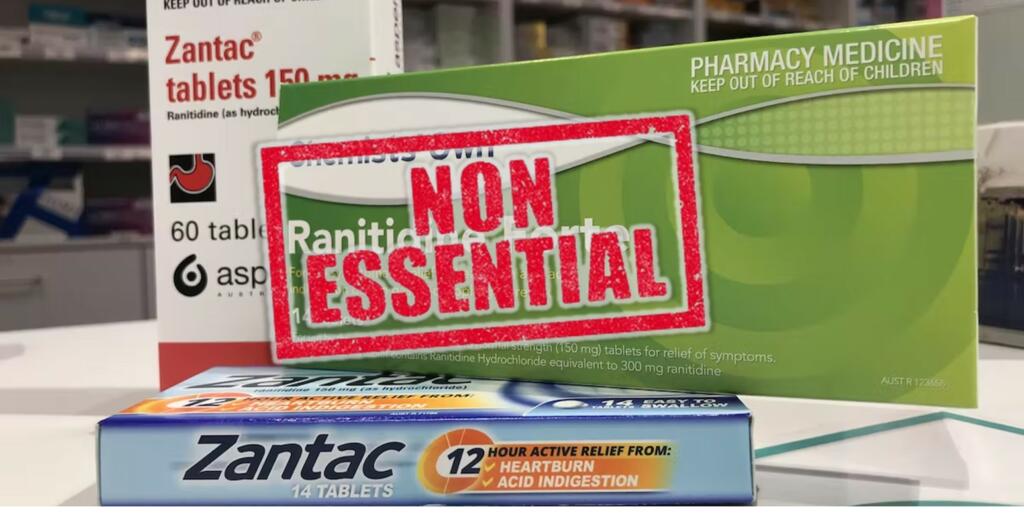If we talk about the ancient culture of the civilisational state Bharat and its residents, they practised a very balanced approach towards life. The lifestyle from the time of waking till going back to bed, a routine was fixed based on nature. The food they consumed contained less to no toxic agents and was loaded with nutrients. As the lifestyle changed, to aptly say degraded, humans ran to medicines for survival. Now, humans all around the world are consuming medicines at an alarming rate. And today’s medicines are no jadi-butis, as they have an ample lot of side effects.
Ranitidine removed from Essential Medicines List
After sounding a public health alert on the cheaply-priced antacid, Ranitidine, the Government of India has finally dropped it from the essential medicines list. Along with Ranitidine, 26 other medicines have also been taken off the list, which contains 384 drugs.
Ranitidine, the widely used antacid, is sold under various brand names like Aciloc, Zinetac, Rantac among others. Ranitidine was introduced in 1981. As soon as it stepped into the market it became the most sought-after medicines for GERD (Gastroesophageal reflux disease) related conditions. It has been sold in more than 120 countries, formulated for the treatment of 222 million patients worldwide, a research report says. The alternatives of Ranitidine like Omeprazole and Pantoprazole have also added to the drugs popularity, courtesy the potential risk of kidney and bone damage caused by the alternatives.
The widely circulated antacid is ‘carcinogenic’
The widely circulated antacid was under scanner throughout the world for cancer causing concerns. The salt has been investigated for the last 3 years. It was after the US-based Food and Drug Administration found probable cancer-causing impurity in the drug.
To your surprise, Drug regulators found cancer-causing impurity N-nitrosodimethylamine (NDMA) at “unacceptable levels” in samples of the drugs containing ranitidine. NDMA is toxic to humans. Overexposure to it can cause several damages to the human body like abdominal cramps, enlargement, and reduced functioning of liver, kidneys among other damages.
Also Read: Dolo’s 1000 crore bribe is just the tip of the iceberg, the rot runs deep
The overhauling of National List of Essential Medicines
Along with Ranitidine, 26 other medicines have been dropped from the list that include Atenolol, Capreomycin, Cetrimide, Erythromycin among others. Along with this, 34 medicines have been approved in the upgraded list of 2022. These include Ivermectin – used to treat parasitic roundworm infections, under ant filarial category, Montelukast, Cefuroxime, Phenoxymethyl penicillin, Terbinafine, Procaine, Benzypenicillin among others. Two drugs have been added under the COVID management category- Dexamethasone under antiallergics and Enoxaparin under medicines affecting coagulation and antiplatelet and antithrombotic medicines. The benefit of the listing is that these medicines will now be sold below a price specified by the government.
The CONCERN
Although the Health Ministry has taken Ranitidine off the essential drugs list, the concern is that the drug will still be available freely in the market and chemists will continue to fish the 40 tablet strip for just Rs 30. Ranitidine, mostly Rantac and Zantac, are among the most purchased medicines in India. There is no need for any prescription to buy it. Thus, this antacid has become one of the medicines consumed by the majority of Indians at will. Doctors, too, prescribe the drug with a running hand despite it being under the radar since 2019.
It has been proven that the salt poses carcinogen. It can only be cut off from public use when the drug prices are raised by the manufacturers, as low prices of these drugs are a big draw. To add on, it is necessary that the public is made aware of the potential losses of such drugs.
Along with tightening the noose around Ranitidine, urgent heed must be paid to many others drugs that have grave side effects but are continuously prescribed and sold. Some of them being Nemuslide (hepatotoxic effects), NSAID– Non Steroidal Anti-Inflammatory Drug like diclofenac (high risk of cardiovascular thrombotic events).
Support TFI:
Support us to strengthen the ‘Right’ ideology of cultural nationalism by purchasing the best quality garments from TFI-STORE.COM
